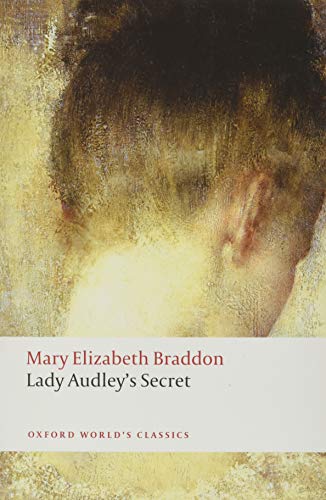Lady Audley's Secret
Tags: mystery, detective-fiction, crime-fiction,
Lucy Graham is a twenty-two-year-old children’s governess in the home of a respected Essex surgeon. She seems to have no past, having arrived penniless from London with a single glowing recommendation from an obscure school mistress. Local widower Sir Micheal Audley, the wealthiest man in the county, smitten by her beauty and charm, makes her an offer she can’t refuse.
“The truth is that Lady Audley had, in becoming the wife of Sir Micheal, made one of those apparently advantageous matches which are apt to draw upon a woman the envy and hatred of her sex.”

Well, it turns out her problem is not with her own sex, but with the other one. Lucy Graham does have a past, and she has more than one secret. Sir Michael’s nephew, the lazy Robert of Fig-Tree Court in London, unwittingly befriends one of those secrets in the form of George Talboys. Talboys goes missing on his first visit to Sir Michael’s estate, and as Robert digs into the mystery, he begins to unearth the past that Lady Audley has worked so hard to conceal.
This reads very much like a Wilkie Collins novel, and if you enjoy his work, you’ll enjoy this one. Here you’ll find lies and deception, murder, blackmail and treachery wrapped in the genteel cloak of English high society, circa 1859. There’s also a good dose, and sometimes an overdose, of chivalry, haunted consciences, looming madness and pious Christian morality.
The plot is as intricate and the social relations as entangled as any you’ll find in Collins or Dickens. The writing is sometimes uneven, with the author occasionally over-explaining plot points or dwelling too long on her characters’ brooding sentiments. But again and again throughout the book you’ll find passages of absolute brilliance, often eclipsing even the best of Dickens and Collins. Braddon has a richly associative mind, tremendous social and psychological insight, and a rare gift for expression.
Because so many mysteries have since been written in this mold, a modern reader sees the plot twists coming. But it hardly matters because the prose is so rich and insightful. It’s like listening to a song you’ve heard before, now being sung by an exceptionally beautiful and expressive voice that reveals nuances you’ve never encountered in past hearings.
This book is also interesting as a cultural artifact. Like today’s thrillers, it was written for the masses, and it takes pains to clearly spell out who the good and bad guys are. In today’s thrillers, the bad guys steal children or blow up buildings or serially kill helpless young women. The good guys put their lives on the line to stop them, getting bruised and bloodied along the way.
In this book, the bad guys (or gals) refuse to conform to Christian social norms. They carry the taint of mental illness. They lie to their spouses and put the honor of the family at risk. Worst of all, they torment the conscience of the good guys who are so morally pure that the mere presence of dishonesty in their midst causes unspeakable anguish. All the bruising and bloodying they endure happens internally, in those soft and admirable emotions.
While the modern villain is a threat to life and limb, the Victorian villain threatens the social fabric and the lofty romantic sentiments of the leisure classes. They threaten social rather than physical constructs.
Still, it’s an excellent read, and a welcome change from today’s tough-cop-psycho-terrorist-shoot-em-ups. Imagine! A plot-based, mass-market thriller with richly drawn, minutely observed characters whose inner lives, full of emotion and wide-ranging thoughts, are actually interesting enough to delve into. What will they think of next?